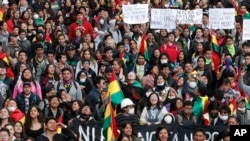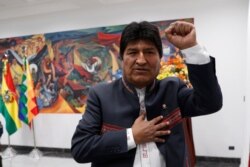Bolivia’s electoral board has given incumbent Evo Morales an outright win in the country’s presidential election.
With almost all the votes counted, the board said Thursday that Morales had won 47.1% of the votes, compared with the 36.5% of his centrist rival, former president Carlos Mesa.
A margin of at least 10 percentage points, according to Bolivian laws, is an outright victory and avoids a runoff.
The Organization of American States, the European Union and Bolivia’s Catholic Church have called for a runoff. The governments of Argentina, Brazil, Colombia and the United States have also called for a second round in the disputed election.
Opposition lawmakers have accused the leftist leader of manipulating the results so he could avoid a runoff.
Morales had said he would participate in a runoff vote if his margin of victory fell below 10 points.
OAS election monitors said there were “irregularities” in the transmission of the results. They said there was a “hard to explain change” in the trend of the count, showing a dramatic shift toward Morales after initially being a tossup.
Since Monday, election-related violence has broken out in different parts of the country, and the opposition has called for a general strike to protest the results.
Mesa called on his supporters to proceed with “permanent mobilization” on the streets until the Supreme Electoral Tribunal, the country’s electoral authority, “recognizes that the second round must take place.”
Morales, Bolivia’s first indigenous president, has led the poor Andean nation for the past 13 years. His popularity has waned amid allegations of corruption and authoritarianism, and he lost a referendum in 2016 that would have allowed him to seek another term as president. However, a constitutional court ruled that in 2017 that he could run again.
With his new victory, Morales will serve until 2025 and will have governed the country for a total of 19 years.






